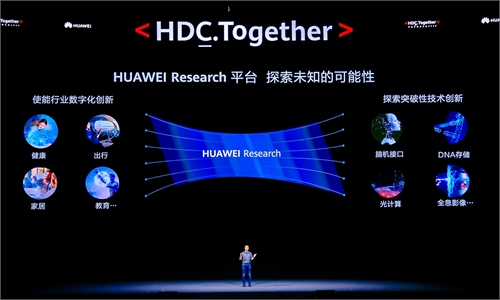SOURCE / INDUSTRIES
Huawei won't run out of microchips despite US’ coercion: expert

Ni Guangnan, academic with the Chinese Academy of Engineering, experiences the Tmall self-service supermarket during the World Internet Conference, Wuzhen Summit in East China's Zhejiang Province in December 2017. Photo: VCG
Huawei will not run out of chips despite the US attempt to kill it as China has realized independent innovation on chips with a "Chinese system," Ni Guangnan, an 81-year-old academic with the Chinese Academy of Engineering in Beijing, told the Global Times on Monday.
He said "even if our country purchases fewer or even no new US CPU chips in the next few years, it will not have a significant impact on China's new infrastructure."
Ni's comments come as the tech war between the US and China heats up and poses a severe threat to the global supply chain, particularly as Tuesday, the deadline for the US government's cutting off the supply of chipsets to Huawei, approaches.
Such hegemonic behavior by the US will certainly cause damage to China, but we have shown in practice that the key information infrastructure related to the national economy and the people's livelihood, as well as general data centers, won't be fundamentally affected, Ni said.
Ni cited two examples, one from June of this year that used the "Chinese system" in a large-scale production system, replacing the traditional system of US minicomputers, Oracle databases and high-end storage. In this case, 12 Intel chips made in 2014 replaced two imported minicomputers worth tens of millions of yuan.
The result showed that performance did not worsen but improved as it processed tens of millions of transactions every day and has been operating normally for nearly three months.
The second example was the largest domestically produced management system for a state-owned enterprise, which was launched in 2016. It replaced multiple sets of Intel servers with old 32, four-core, 40-nanometer domestically produced CPUs. This supported 105,000 users, and it had a response time of less than two seconds. It has been operating stably since then.
Even if our country's chip industry is stuck, conventionally made domestic CPUs or a large number of old Intel CPUs, or even the readily available CPU chips for ordinary PCs, can be used to ensure the operations of our key information infrastructure and general data centers, Ni said.
"The US' attempt to kill China's chip industry may only end up shooting itself in the foot," Ni said.


